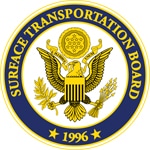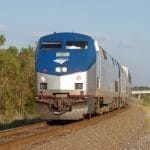SMART TD State Legislative Director of the New England States, George Casey, reports that he and Assistant State Legislative Director Chris Weldon attended a presentation given by Senator Elizabeth Warren (Mass. – D) that focused on “America’s Agenda.” Mass. AFL-CIO executive board members.
“We discussed FAST Act repercussions on Amtrak and two-person crews,” Casey said.
According to Warren’s website, “America’s Agenda” is about the economic security of working families and what can be done to rebuild the middle class. Warren is currently traveling across Massachusetts, giving presentations on this agenda.
Click here to view a video on Warren’s agenda.
Tag: Amtrak
Federal Agency Charged Railroad Company Refused to Hire Qualified Machinist Due to Epilepsy

According to EEOC’s suit, Amtrak withdrew its job offer of machinist journeyman at its Seattle yard when it learned Shawn Moe had a history of three epileptic seizures over the course of his life. Amtrak cited safety concerns, despite Moe’s record of safely working a similar job and despite his neurologist verifying to Amtrak that his epilepsy was successfully controlled on medication, that he had been seizure-free for years, and that he was able to safely perform the essential functions of the job without limitation while on medication.
“The fact that I have epilepsy has never prevented me from safely doing my job, not in the years I worked for another locomotive company before I applied to Amtrak, and not at the railroad machinist job I found after Amtrak took back its job offer,” said Moe. “Amtrak’s decision to withdraw its offer hit my family at a particularly vulnerable time because my wife and I just had our first baby. I thought, what if other employers react as Amtrak did and I can no longer practice my trade? How would I support my family?”
The Americans with Disabilities Act (ADA) prohibits an employer from discriminating against an employee because of his disability, and also requires an employer to assess a worker’s actual ability to perform job functions where potential safety concerns are raised. EEOC filed suit in U.S. District Court for the Western District of Washington [Case No. 2:15-cv-01269] after first attempting to reach a pre-litigation settlement through its conciliation process.
The three-year consent decree settling the lawsuit provides $112,000 to Moe in lost wages and compensatory damages. The decree also requires Amtrak to train its staff on hiring obligations and assessing reasonable accommodations under the ADA. Amtrak will also implement and disseminate a modified ADA policy, and will post a notice for employees about the consent decree and employees’ rights under the ADA.
EEOC Senior Trial Attorney May Che said, “Amtrak concluded that Mr. Moe presented a significant safety risk without assessing the actual likelihood of him having a seizure at all. In enacting the ADA, Congress stated that employers must rely on objective, factual evidence — not on subjective perceptions, irrational fears, and patronizing attitudes — about the nature or effect of a particular disability, or of disability generally.”
EEOC Seattle Field Director Nancy Sienko added, “One out of every 26 people will develop epilepsy at some point in their lives. Given that epilepsy reportedly affects 2.2 million Americans and affects each person differently, it is critical that employers do not base job decisions on stereotypes, but instead carefully consider an employee’s abilities.”
According to publicly available information and its website, www.amtrak.com, Amtrak is a publicly funded service, operated and managed as a for-profit corporation with headquartered in Washington, D.C. In fiscal year 2015, Amtrak served over 30.8 million passengers and had $3.2 billion in revenue, while employing more than 20,000 people nationwide.
EEOC enforces federal laws prohibiting employment discrimination. Further information about EEOC is available on its website at www.eeoc.gov.

First, the Board decided that it would consider on-time arrival and departure at all stations along a passenger train’s route for purposes of assessing on-time performance. The Board will deem a train “on time” if it arrives at, or departs from, a station no more than 15 minutes after its scheduled arrival or departure.
The Board also announced that it is withdrawing its proposed policy statement on issues that may arise, and evidence to be presented in proceedings under PRIIA, in favor of a case-by-case approach to these complex matters.
“Reflecting careful consideration of an extensive public and stakeholder response to our most recent passenger rail proposals, these decisions will better position the Board to implement its responsibilities under the Passenger Rail Investment and Improvement Act of 2008,” stated Board Chairman Daniel R. Elliott III. “Improved passenger train on-time performance is an important goal, and the Board’s decisions will support that goal by clarifying the trigger for starting a proceeding, while allowing more complex and detailed issues to be resolved in the context of individual cases.”
Click the link to view the Board’s decision on On-Time Performance Under Section 213 of the Passenger Rail Investment and Improvement Act of 2008, Docket No. EP 726.
Click the following link to view the Board’s decision on Policy Statement on Implementing Intercity Passenger Train On-Time Performance and Preference Provisions of 49 U.S.C. § 24308(c) and (f), Docket No. EP 728.

Southwest Chief Amtrak Train 3 was traveling from Chicago to L.A. with 286 passengers when the accident occurred. None of the Amtrak passengers suffered any injuries as a result of the accident.
According to police, the van failed to yield the right of way to the train, which then struck the left side of the vehicle.
Read more from The Washington Post.
Progressive Railroading reported that the president of the National Association of Railroad Passengers (NARP) recently urged federal leaders to fast-track the requisite approvals for replacing the Hudson River rail tunnels. Read the entire story here.


The derailment caused eight people to lose their lives and over 200 injuries. The NTSB found that “the probable cause of the accident was the engineer’s acceleration to 106 miles per hour as he entered a curve with a 50 mile per hour speed restriction, due to his loss of situational awareness likely because his attention was diverted to an emergency situation with another train. Contributing to the accident was the lack of a positive train control (PTC) system. Contributing to the severity of the injuries was the inadequate requirements for occupant protection in the event of a train overturning.”
The NTSB also made numerous recommendations to the Federal Railroad Administration (FRA), Amtrak, American Public Transportation Association (APTA), Association of American Railroads (AAR), Philadelphia first responders, Philadelphia’s mayor and National first responders organizations based on the accident and their findings.
The NTSB recommended to the FRA that they consider requiring railroads to install procedures where no PTC is present; modify existing regulations to include the number of crewmembers required in the cab of the locomotive and use the data regarding the number of crewmembers in the controlling cab of the train at the time of an accident to evaluate safety adequacy of current crew size regulations; and conduct research to evaluate the causes of passenger injuries and evaluate methods for mitigating those injuries such as the use of seat belts and implement any findings.
The NTSB recommended to Amtrak that they incorporate training strategies for operating crewmembers and new hires to recognize and effectively manage multiple concurrent tasks in prolonged, atypical situations.
Click here to read a summary of the NTSB’s findings.
Click here to read NTSB Chairman Christopher Hart’s opening statement.
Click here to read the presentation given by the NTSB.
Click here to read Hart’s closing statement.
Click here to view the webcast.
Project includes new passenger platforms in Middlebury, Vergennes and Burlington, Vermont

“Transportation is always about the future. If we’re just fixing today’s problems, we’ll fall further and further behind. We already know that a growing population and increasing freight traffic will require our system to do more,” said Secretary Foxx. “In this round of TIGER grants, we selected projects that focus on where the country’s transportation infrastructure needs to be in the future: safer, more innovative, and more targeted to open the floodgates of opportunity across America.”
The $10 million grant will fund approximately 11 miles of new rail track along the state-owned line and three passenger platforms in Middlebury, Vergennes, and Burlington, Vermont. The project will also reduce long-term maintenance costs for the state, allow passenger trains to operate up to 60 miles per hour and enhance safety at multiple railroad crossings.
The project is one of 39 federally funded transportation projects in 34 states selected to receive a total of nearly $500 million under the Department’s Transportation Investment Generating Economic Recovery (TIGER) 2015 program. Secretary Foxx announced project selections for this round of TIGER grants on October 29, 2015. The Department received 627 eligible applications from 50 states and several U.S. territories, including tribal governments, requesting 20 times the $500 million available for the program, or $10.1 billion, for needed transportation projects.
“This is a day Burlington has been waiting a long time for – this funding will help not only take us back to a time when passenger rail extended to Burlington, but more importantly, it will take us into the future,” said Feinberg.
With this latest round of funding, TIGER continues to invest in transformative projects that will provide significant and measurable improvements over existing conditions. The awards recognize projects nationwide that will advance key transportation goals such as safety, innovation and opportunity.
This grant is part of the seventh round of TIGER grants since 2009, bringing the total grant amount to more than $4.6 billion provided to 381 projects in all 50 states, the District of Columbia, and Puerto Rico, including 134 projects supporting rural and tribal communities. Demand for the program has been overwhelming: to date. The U.S. Department of Transportation has received more than 6,700 applications requesting more than $134 billion for transportation projects across the country.
Click here for additional information on individual TIGER grants.

The Senate Appropriations Subcommittee on Transportation, Housing and Urban Development (THUD) passed $56.5 billion legislation to fund its programs for Fiscal Year (FY) 2017. The bill includes several positive allocations for rail:
- $1.7 billion for the Federal Railroad Administration – $76 million above FY 2016 enacted level
- $525 million for TIGER Grants – $25 million above FY 2016 enacted level
- $2.3 billion for Capital Investment Grants (New Starts) — $161 million above FY 2016 enacted level
- Amtrak: $345 million for the Northeast Corridor and $1.075 billion for the National Network – total $30 million above FY 2016 enacted levels
- New passenger rail grant programs created under FAST Act: $50 million for Consolidation Rail and Infrastructure and Improvement grants; $20 million for State of Good Repair grants; and $15 million for Restoration and Enhancement grants
The Senate also passed legislation that would reauthorize the Federal Aviation Administration (FAA) through FY 2017. The legislation would authorize the appropriation of $155 million from the Airport and Airway Trust Fund for the Essential Air Service (EAS) for each of the FYs 2016 and 2017.
Both pieces of legislation face more hurdles before they become law, but we are pleased that they include positive developments for our rail and air members.
